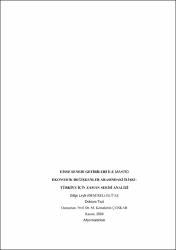Hisse senedi getirileri ile makro ekonomik değişkenler arasındaki ilişki: Türkiye için zaman serisi analizi
Künye
Demirel Elitaş Bilge Leyli ''Hisse Senedi Getirileri İle Makro Ekonomik Değişkenler Arasındaki İlişki: Türkiye İçin’’ Zaman Serisi Analizi ‘’The Relationship Between The Stock Returns And The Macro Economic Variables: Time Series Analysis For Turkey’’Afyon Kocatepe Üniversitesi Afyonkarahisar 2010Özet
Bu çalışma Türkiye’de hisse senedi getirileri ile makro ekonomik değişkenler arasındaki nedensellik ilişkisini araştırmaktadır. Bu amaçla 1998 yılının birinci çeyreği ile 2009 yılının son çeyreği arasındaki dönemi kapsayan veriler kullanılarak; VAR (Vector Autoregression) ve Vektör Hata Düzeltme Modeli (Vector Error Correction Model-VECM) yardımıyla Granger nedensellik analizi ve etki-tepki fonksiyonu analizleri yapılmıştır. Uzun dönemli ilişkiler koentegrasyon yöntemi ile tespit edilmiştir. Ampirik sonuçlara göre üretim seviyesinden hisse senedi endeksine doğru sadece uzun dönemde, hisse senedi endeksinden üretim seviyesine doğru ise hem kısa dönemde hem de uzun dönemde geçerlidir. Para arzından hisse senedi endeksine doğru kısa dönem nedensellik vardır. Hisse senedi endeksinden para arzına doğru ise sadece uzun dönem nedensellik bulunmaktadır. Hisse senedi ve döviz kuru arasındaki nedensellik ilişkisi döviz kurundan hisse senedi endeksine doğru uzun dönemde, hisse senedi endeksinden döviz kuruna doğru ise hem kısa hem de uzun dönemde geçerlidir. Ampirik sonuçlar hisse senedi endeksi ve faiz oranı arasında tek yönlü kısa dönem nedenselliği göstermektedir. Nedenselliğin yönü hisse senedi endeksinden faiz oranına doğrudur. Hisse senedi endeksi ve enflasyon arasında nedensellik ilişkisi bulunamamıştır. Koentegrasyon denklemleri sonuçlarına göre uzun dönemde üretim seviyesi ve para arzı hisse senedi endeksini pozitif, döviz kuru ise negatif etkilemektedir.
Etki tepki fonksiyonu analizlerine göre üretim seviyesi ve para arzı değişkenlerinin hisse senedi endeksine pozitif; döviz kurunun ise hisse senedi endeksine negatif tepkisi bulunmaktadır. Hisse senedi endeksinin para arzı ve üretim seviyesine olan tepkisi pozitif; döviz kuruna olan tepkisi ise negatiftir. Ayrıca, hisse senedi endeksi ile faiz oranı ve enflasyon oranının karşılıklı olarak tepkileri dönemlere göre farklılık göstermektedir. This study examines causality relations between macro-economic variables and stock returns. In this sense, Granger causality and impulse-response functions analyses have been conducted through the instrumentality of VAR and VECM based on the data between the first period of 1998 and last period of 2009. Long-run relations have been explored with cointegration method. The relations, to the empirical evidence, prevail in the long-run from output to stock index; however, do prevail in both short and long-run from stock index to output. Short-run causality is found from money supply to stock index. Only long-run relations are found from stock index to money-supply. Considering the relations between stock index and exchange rate, it is revealed that from exchange rate to stock index there exist causality relations in the long-run; however, from stock index to exchange rate it does both in short and long-run. Also results indicate that there is a one-way short- run relation between stock index and interest rate in which causality is in direction from stock index to interest rate. No relation is found between stock index and inflation. Cointegration equation results show that output and money supply effects stock index positively in the long run, however, exchange rate effects it negatively.
The impulse-response functions (IRF) analyses reveal that the variables production amount and money supply response positively to the stock index, on the other hand, exchange rate response negatively to the stock index. The responses of stock index to the money supply and production amount are positive, but it is negative to the exchange rate. Finally, mutual responses among stock index, interest rate and inflation rate differs on the basis of time periods.



















